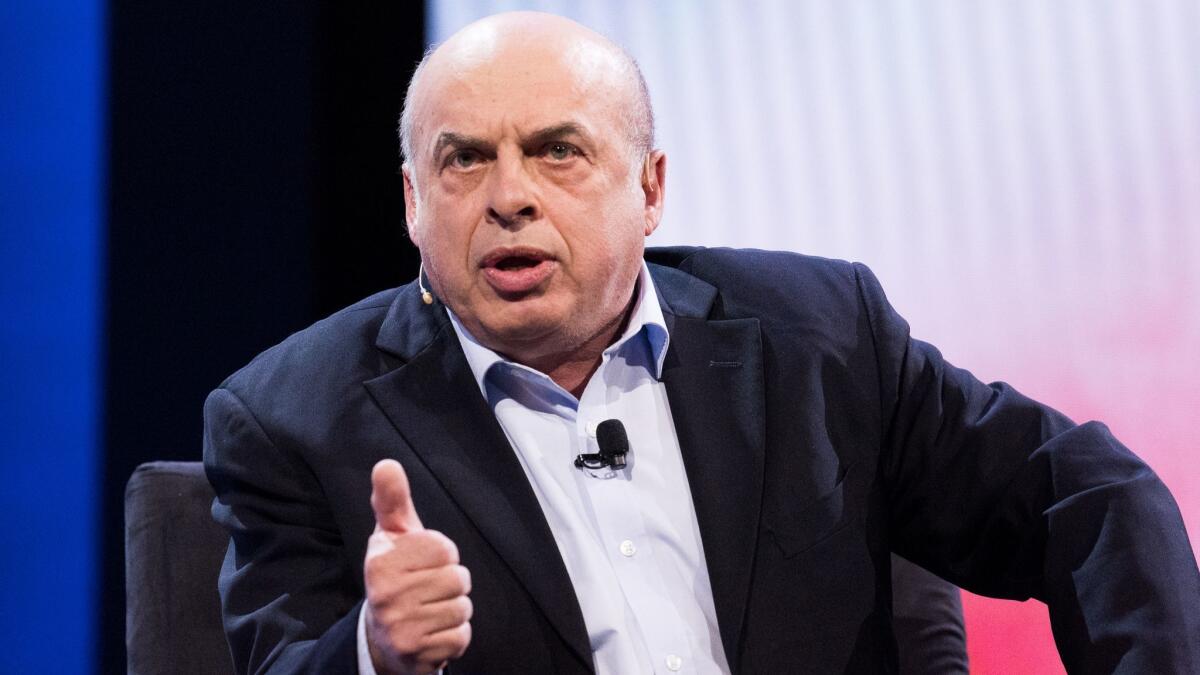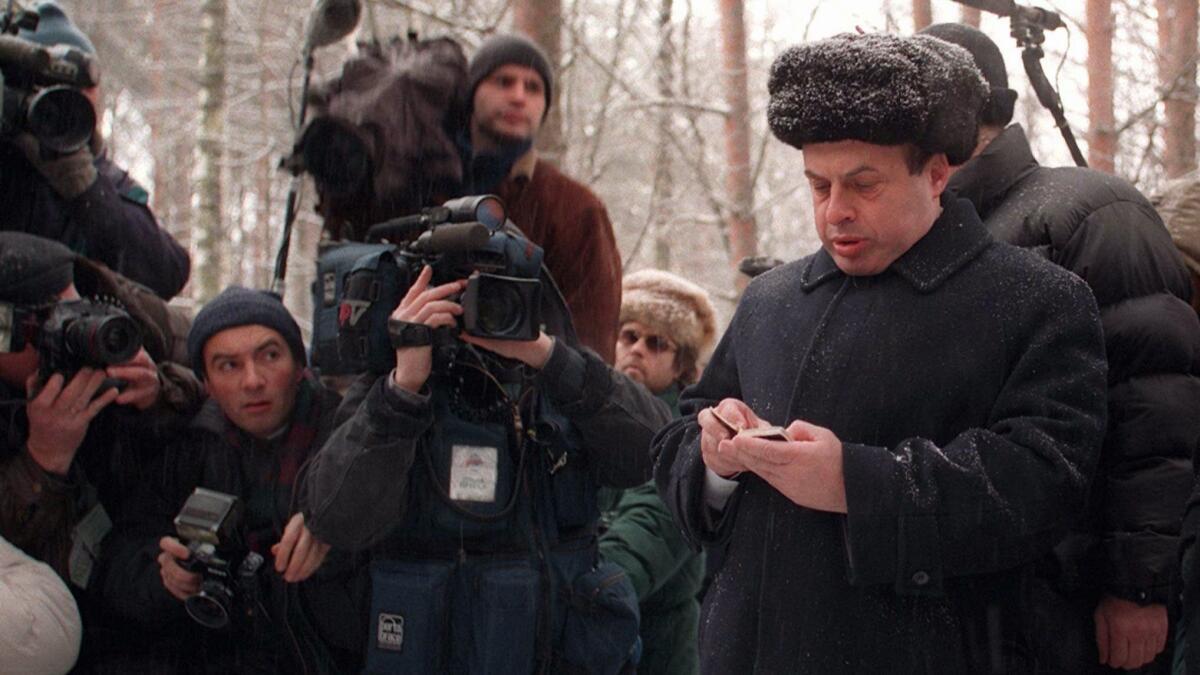Natan Sharansky: If I were an American liberal, I’d ask why women voted for Trump

Natan Sharansky, the Soviet refusenik who became an Israeli politician, is winding down a long and serpentine career in public service that took him from the gulag to the halls of power.
Born Anatoly Borisovich Shcharansky in what is now Donetsk, Ukraine, Sharansky rose to international prominence as one of the leading dissidents in Leonid Brezhnev’s Soviet Union.
In 1986, after serving nine years of hard labor on charges of treason and espionage, he became one of the most prominent political prisoners released by the Soviet Union. He immigrated to Israel, where he quickly threw himself into political life, founding a political party representing the interests of former Soviet Jews. It eventually was incorporated into Prime Minister Benjamin Netanyahu’s right-wing Likud party.

He is now retiring after nine years as chairman of the Jewish Agency, a quasi-governmental body responsible for Israel’s ties to the Jewish diaspora.
He spoke to The Times last week, the day he became a grandfather for the seventh time. His remarks are edited for length and clarity.
How do you understand the political upheaval roiling the Western world?
It’s entirely expected. All people want and need are two things: to be free and to belong. It may seem contradictory, but individualism is innate in us, as is the desire to belong to something bigger than your own personal life: history, faith, a movement.
Identity and freedom are two poles, two natural longings, and ideally, one can boost the other.
But Europe after World War II decided that 200 years of religious wars and 100 years of nationalist wars were enough and chose “post-identity” — a seductive but empty ideology in which you have freedom from nothing. No identity. That became the European ideal.
Someone I knew observed that Europeans learned to enjoy freedom but not to fight for it. I told this to [former German Foreign Minister] Joschka Fischer, a great friend of Israel, and he replied “What? You want us to be fascists?”
That is the problem: the view that either you have no identity or you are fascist.
And in the Middle East?
In the Middle East one always sacrifices freedom for identity, though Israel is in a unique situation.
President Trump is meeting President Putin to discuss an important matter for Israel, Iran’s military presence in Syria, and there is talk of a deal in which the U.S. would lift sanctions imposed on Russia when it invaded [the Ukrainian peninsula of] Crimea in exchange for an Iranian withdrawal in Syria. What’s your take?
The problems in Ukraine and Syria are huge failures of President Obama’s foreign policy. The Russians were very patient about Crimea, slowly testing Obama and acting only when they were sure he’d do nothing. The annexation of Crimea would never have happened had he reacted differently.
It’s a huge failure of the free world, really, the first breach of the Helsinki Accords — no change of borders by force — and a huge challenge for the West.
If I were an American liberal I would ask myself day and night why 41% of women voted for Trump, and I’d worry less about Israel.
— Natan Sharansky
And there would be no Russian military base in Syria if it weren’t for Obama’s policy of “red lines” that failed so spectacularly. Obama’s policy permitted a Russian toehold in the Middle East for the first time in 50 years, and now it appears Trump will continue the policy, allowing Putin to remain.
We have to be involved with what is happening in Syria because it’s life or death for us, but Israel should never be involved in negotiations over the fate of Ukraine. It would be a huge mistake. We’re not a superpower.
Are you involved in discussions with Russia?
No. In 1997, during my first official visit to Russia, I was asked to warn the Russians that we know about leakage of Russian technologies to Iran and to make it clear this was the single most important factor that could influence our relations.
Nothing has changed. Unfortunately, Iran develops these technologies and promotes an ideology of “the world without Israel” — their words — and we don’t have the world’s complete cooperation to fight its aggression.
Did you foresee war between your place of birth and your native country?
(Chuckling) If anyone had asked me whether there would be an interplanetary war or Russia would go to war against Ukraine, I would have said the first.
When I grew up in the Soviet Union there was no difference between “Russia” and “Ukraine.”
How well do you know Putin?
I met him many times but not in the past decade. I’ll say this: He told me it was a mistake of the previous regime to consider independent Jewish life bad for Russia. He said he’d always support the right of Jews to live as Jews, and he is true to his word. It is very unusual that a Russian leader is not anti-Semitic.
But under my second hat, as a combatant for human rights, I have nothing good to say about him.
Austrian Chancellor Sebastian Kurz, whose coalition party was established by Nazis, recently visited Israel and Hungarian Prime Minister Viktor Orban will be welcomed in Jerusalem next week despite running an openly anti-Semitic campaign. Has Israel abandoned its role as a defender of Jews?
Israel has the right to pursue state interests but it cannot be blind regarding anti-Jewish leaders. We can’t change electoral results. But it’s crucial the Israeli government remain in constant dialogue with Jewish communities everywhere. In every case, there must always be a visible correlation between a nation’s attitude to Jews and to Israel.
Israel has to stand against anti-Semitism on the left and on the right. Both those who like Israel and hate Jews and those who like Jews and hate Israel are not our allies.
President Trump defended neo-Nazis marching in Charlottesville, Va.
Israel should have been more forceful about those remarks.
What do you say to liberal American Jews who feel bereft with the Trump and Netanyahu governments in power?
I welcome liberal anger today, but I ask myself where is the anger of respectable Jewish organizations when Black Lives Matter or feminist marches adopt anti-Israel positions that are inseparable from the anti-Semitism?
If I were an American liberal I would ask myself day and night why 41% of women voted for Trump, and I’d worry less about Israel.
Netanyahu has alienated American Jewish communities and quashed agreements with Jewish leadership. What about Israel-diaspora ties?
Our survival strategies are necessarily different. Israelis live in a Jewish, democratic state in a challenging region. For American Jews, survival means not assimilating and defending a liberal society that welcomes minorities. But what unites us is the desire to continue our path as one people.
Tarnopolsky is a special correspondent
More to Read
Start your day right
Sign up for Essential California for news, features and recommendations from the L.A. Times and beyond in your inbox six days a week.
You may occasionally receive promotional content from the Los Angeles Times.






